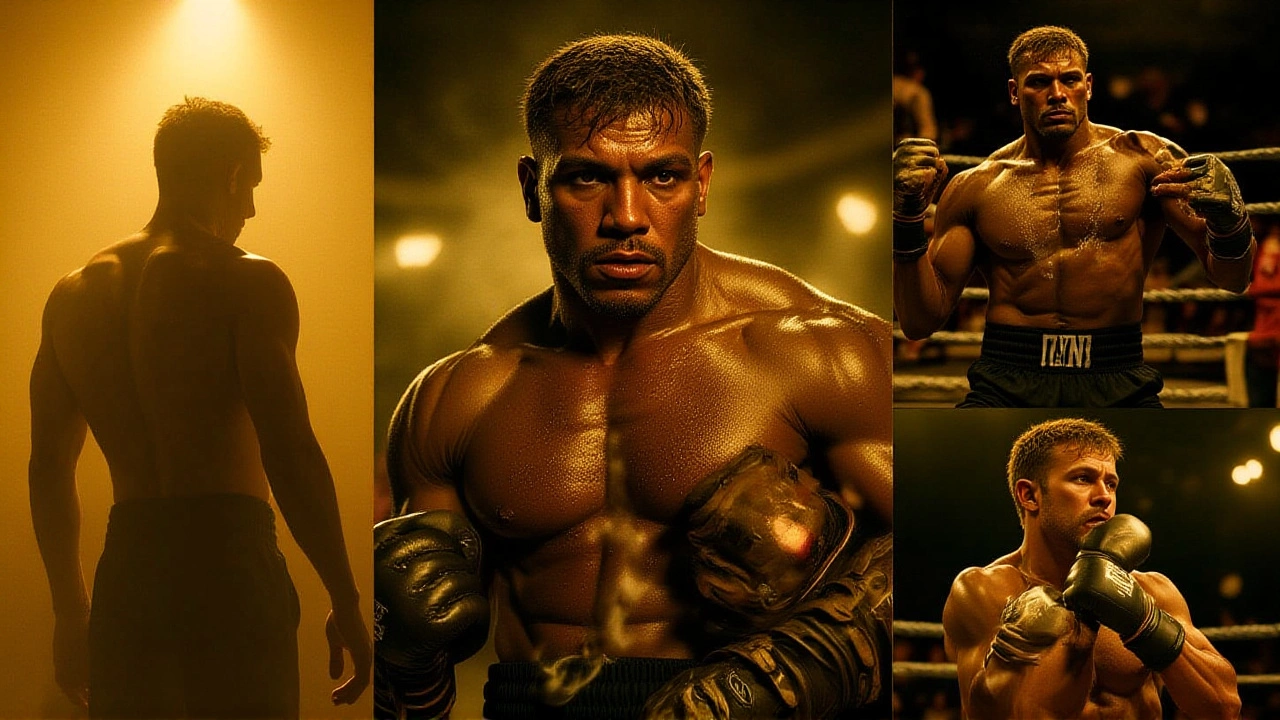
When Anthony Joshua stepped away from the ring after his brutal knockout loss to Daniel Dubois in October 2024, few expected he’d return not for a title shot, but for a $92 million payday against a man who built his fame on YouTube memes and TikTok challenges. Now, on the Anthony Joshua vs. Jake Paul fightLos Angeles, the British heavyweight legend and the American social media phenom will step into the ring — not for glory, but for unprecedented wealth. The event, streaming exclusively on Netflix, marks a seismic shift in boxing’s economic landscape, with a combined purse of exactly $184 million — the largest ever for a non-title bout in history.
Why This Fight Wasn’t Supposed to Happen
Joshua, 36, was widely expected to rebuild his career with a tune-up fight in early 2025, then challenge Tyson Fury for the undisputed heavyweight crown later that year. Instead, Netflix and Most Valuable Promotions, the company Jake Paul co-founded with his brother Mark Edward Paul, offered a deal so staggering it rewrote the rules. Joshua’s previous career-high earnings — roughly $50 million from his two fights against Oleksandr Usyk — suddenly looked like pocket change. For Paul, who earned $40 million in his August 2024 bout against Fury, this isn’t just a step up — it’s a quantum leap.The move wasn’t just financial. UK boxing authorities reportedly banned the event from being held on British soil, forcing organizers to relocate to Los Angeles. The reason? No official statement was released, but insiders suggest concerns over the fight’s sporting legitimacy and the spectacle-driven nature of the matchup played a role. What’s undeniable: this isn’t boxing as we knew it. It’s entertainment, packaged as sport, funded by streaming giants hungry for subscribers.
The Money Behind the Match
The $184 million purse doesn’t just include base salaries. Netflix is footing the entire bill — a direct investment in live sports content under the leadership of co-CEOs Ted Sarandos and Greg Peters. For Joshua, it’s a lifeline after a career slump. For Paul, it’s the ultimate validation: a man who turned viral videos into a boxing empire now out-earns the sport’s most decorated champions.Here’s the twist: DAZN Media LLC, the London-based streaming service that holds Joshua’s long-term contract, reportedly received a multi-million dollar payout to release him. No exact figure was disclosed, but sources say it was enough to make DAZN walk away — a sign that even traditional sports platforms are being outbid by tech giants willing to gamble on spectacle.
Paul’s earnings don’t stop at his $92 million base. As co-founder of Most Valuable Promotions, he also controls the event’s streaming rights, merchandise, and pay-per-view splits. Joshua, meanwhile, gets paid by Netflix — no middleman, no cuts. The undercard fighters? They’re also making six figures, unheard of for non-title undercards just five years ago.
The Mismatch That Divided the Sport
From a technical standpoint, the fight makes no sense. Joshua stands 6’6”, weighs around 240 pounds. Paul, at 5’11” and estimated at 200 pounds, is nearly six inches shorter and possibly 40 pounds lighter. Boxing analyst Andy Bunce called it “ridiculous,” adding, “This isn’t a fight — it’s a financial transaction with gloves on.”Paul’s pro record? 12 wins, 2 losses — both to seasoned fighters, but neither to elite-level competition. His rise was fueled by social media virality, not ring pedigree. Joshua, by contrast, is a former unified champion, Olympic gold medalist, and global icon. Critics argue he’s sacrificing legacy for lucre. But Joshua’s own words tell a different story: “You’ll see a lot more fighters take these opportunities. I’m here to do massive numbers, have big fights, and break every record.”
Former UFC champion Michael Bisping captured the mood perfectly in a YouTube video: “It’s a win-win for Jake Paul, and it’s a lose-lose for Anthony Joshua. However… who gives a damn? When you can bank $92 million for having a little move around in a boxing ring, fair play. You can’t s*** on that.”

What This Means for Boxing’s Future
This isn’t an isolated incident. The rise of crossover fights — where influencers, streamers, and TikTok stars enter the ring — has been building for years. But this is the first time a former unified champion has taken such a leap. The ripple effects are already visible: younger fighters are now asking agents not about title shots, but about Netflix deals.Traditional promoters are scrambling. Promoters like Top Rank and Matchroom, who built careers on long-term fighter development, now face a new reality: a social media star with 20 million followers can outbid them in minutes. Netflix’s investment signals a broader trend — live sports are no longer the exclusive domain of cable networks. Streaming platforms are buying their way into the biggest moments.
And let’s not forget the audience. The fight isn’t just about boxing fans. It’s about Gen Z, millennials, and casual viewers who’ve never watched a 12-round bout — but will tune in because they know Jake Paul’s face. Netflix doesn’t need purists. It needs eyeballs. And it’s willing to pay $184 million to get them.
What’s Next?
If this fight draws 20 million+ Netflix streams — a conservative estimate — it will become the most-watched non-title boxing event ever. Expect more: KSI is reportedly in talks for a 2026 bout. Logan Paul has hinted at a rematch with Fury. Even UFC stars are eyeing boxing crossover deals.One thing is certain: boxing’s future won’t be decided in gyms or by sanctioning bodies. It’ll be decided in boardrooms — by executives at Netflix, Amazon, and Apple, who care less about legacy and more about engagement metrics.
Frequently Asked Questions
Why did Anthony Joshua choose this fight over a rematch with Tyson Fury?
Joshua’s team was offered $92 million upfront by Netflix — more than double what he made from his two fights against Oleksandr Usyk combined. With Fury’s camp demanding a 50/50 revenue split and a date in 2026 that would delay his return, the Netflix deal was immediate, guaranteed, and far more lucrative. For Joshua, it’s not about legacy anymore — it’s about financial security and global reach.
How is Jake Paul able to earn more than a two-time world champion?
Jake Paul isn’t just a fighter — he’s the promoter, the brand, and the social media engine behind the event. His company, Most Valuable Promotions, controls streaming rights, merchandising, and digital content. His 30 million followers on TikTok and YouTube translate directly into ticket sales and ad revenue. Joshua gets paid to fight. Paul gets paid for everything — including the hype.
Was the fight banned in the UK for safety reasons?
No official reason was given, but experts believe UK boxing regulators objected to the mismatch’s lack of sporting integrity, not safety. The British Boxing Board of Control has previously criticized crossover fights for undermining the sport’s credibility. Relocating to Los Angeles allowed Netflix to bypass UK oversight entirely — a sign of how global streaming platforms now operate outside traditional sports governance.
Does this mean boxing is becoming more like WWE?
In terms of economics and marketing, yes. The storylines, the personalities, the spectacle — it’s all modeled after entertainment franchises. But unlike WWE, these are real fighters with real training. The difference is the motivation: profit over prestige. The sport’s governing bodies are losing control. The new rules are set by algorithms and subscription numbers, not sanctioning titles.
What’s the impact on other boxers?
Mid-tier fighters are now being offered six-figure purses for undercard spots — unheard of before. But the top tier is being pulled away from traditional paths. Fighters who once dreamed of Olympic gold or WBC belts now ask: ‘Can I get a Netflix deal?’ The sport’s talent pipeline is shifting from gyms to Instagram.
Will this hurt boxing’s credibility long-term?
It already has. Purists are outraged. But casual viewers are tuning in. Netflix’s investment proves there’s money in spectacle — and money drives innovation. The question isn’t whether this is good boxing. It’s whether boxing can survive without adapting to this new reality. The answer, for now, seems to be: only if it evolves.




